The 7 Best Web Scraping Dedicated and Shared Proxy Providers
Anda Miuțescu on Jul 19 2021
Web scraping entails paying close attention to a vast number of obstacles. Proxies should be the first solution you think about when collecting data off the Internet. At least, that’s the first step if you don’t want to run into problems from square one.
We have already expanded on the many kinds of proxies available: residential, datacenter, mobile, or rotating. In this article, however, we want to show you how to get both quality and quantity with proper research on dedicated and shared proxies.
Finding the best solution for your project can be tricky. After all, there are plenty of options, but how do you find the best solution for the lowest costs? We intend to answer that question for you, and to do that, we’ve come up with a list of the best providers we could find.
Web scraping with proxies
Proxies function as an added layer between your device and the vast Internet. Typically, you get them from third-party service providers who use their servers to redirect device requests for you. The result is that the visited websites see the proxy’s IP instead of your actual address.
Web scraping helps you overcome information shortages by allowing you to collect and combine any type of data, convert and save it in the proper format, retrieve it, analyze it, and use it in any way you want.
While web scrapers have seen an unprecedented rise in popularity, it’s not unanimously liked. Plenty of websites dislike foreign bots since those often try to cause damage. So, web scrapers are often lumped together with spam or DDoS scripts and blocked by the website.
While extracting data, a site may notice your bot and promptly put your IP on a blacklist, block it, and stop you from accessing the information. If your actual IP address gets blocked, it’s a pretty big problem. If you use a proxy, though, you lose one IP at worst. So, the proxy server acts as your shield so that you can scrape in peace.
So, it’s pretty clear that proxies are a must. But what kind works best? To answer that question, we first have to define what are shared and dedicated proxies.
What is a shared proxy?
Shared, or semi-dedicated proxies are named quite accurately. Service providers that offer shared proxies lend a single IP to several customers. Generally speaking, the number of concurrent users is small, but there’s no official rule on the maximum allowed number. So, while your actual address is hidden, you don’t have complete control over how the proxy is used.
While this might sound a tad dodgy to you, it is nothing to be concerned about. People choose shared proxies because they come at a lower price point than dedicated proxies. They are also cheaper for proxy providers to maintain and offer you a better bang for your buck by distributing the cost over the multiple users sharing the same IP addresses.
Another benefit is a larger pool of IP addresses. Let’s say the provider has 100,000 proxies and 10,000 customers. They could only offer ten dedicated proxies to each client, but each would receive exponentially more IPs if the proxies were shared among users.
What puts shared proxies on our radar is the anonymous benefit of a large proxy pool and the lowered costs. The main drawback is that other clients may get the IP banned on websites you also wanted to access. If you’re a beginner, you might as well consider them to test out your scraping skills.
While not spotlessly efficient, shared proxies do their job in fooling websites into thinking you’re from a different country. They may think you’re browsing from the US while you’re currently on your exotic getaway in Thailand. This way, you can increase your anonymity on the web and bypass geo-restrictions.
What is a dedicated proxy?
The opposite of collective is, of course, singular. Dedicated proxies are also called private proxies for an obvious reason - you’re the only one using them. Because only one person has access, these proxies offer users complete control over bandwidth, privacy, and exclusive IP addresses. This is the reason why, when web scraping, dedicated IPs are the wisest choice - you don’t have to worry that another’s actions can affect your results.
The primary advantage is absolute control. Since you do not have to deal with others using the same IP address, you get high anonymity.
When talking about bandwidth overload, private IPs are the superior choice. Since you’re the only one funneling data through the proxy, you can expect greater speeds than proxies that split their bandwidth between several users.
When people talk about using proxies, they’re most likely talking about private IPs since they offer the anonymity, speed, and control developers expect.
Shared vs. Dedicated Proxies
In the most simple terms, the choice between shared and dedicated proxies boils down to a simple question: What matters more to you, lowering the costs or raising the quality?
Shared proxies will always be cheaper than entirely private ones, as you’ll see in the provider list. While the price is undoubtedly an advantage, you’ll also have to deal with these drawbacks:
- You have higher chances of getting blocked due to other clients who use the same IPs as you. Sites like Amazon or Google are popular targets, so there’s a good chance that another user has already sent too many requests to them and got the IP blocked.
- The scraper will stand out more because the IP will generally be much more active due to the requests coming from multiple customers. Unusual activity often results in being sent to CAPTCHA pages or outright banned.
- You can expect lower speed since you’re sharing the server’s bandwidth with other users. Moreover, you won’t always have a steady pace since it goes down the more people use the proxy.
While shared proxies have some heavy disadvantages, it all depends on how serious you are about web scraping and the type of data you wish to collect. Popular scraping websites will block you more often, especially if you need large quantities of data. Small projects, however, or those that target less popular websites may not experience significant problems. So, shared proxies work well for smaller jobs and beginners.
Dedicated proxies are in many ways the opposite. They will always have higher prices, but the disadvantages below turn into advantages here:
- As only you have access to the IP, there’s no risk that the websites you target already associated the IP with a bot.
- As long as you make sure the web scraper doesn’t attract attention to itself and imitates regular visitors, it’s unlikely that you’ll get blocked.
- As long as the proxy isn’t a continent away from your location, you can expect good speeds and little to no fluctuations.
If shared proxies are a good way to gain web scraping experience, private IPs are much more likely to get you all the data you want. You’ll have higher operational costs but also much higher efficiency.
Best Dedicated and Shared Proxy Providers
When making this list, our focus was first and foremost on finding providers that offer both shared and dedicated proxies. After all, once you know the difference, it’s time to learn about providers, their quirks and decide which fits your needs the most.
That being said, the main objective here is to help you out. So, if we include a few providers that don’t fit the mold, it’s because we believe they’re worth your time.
1. WebScrapingAPI
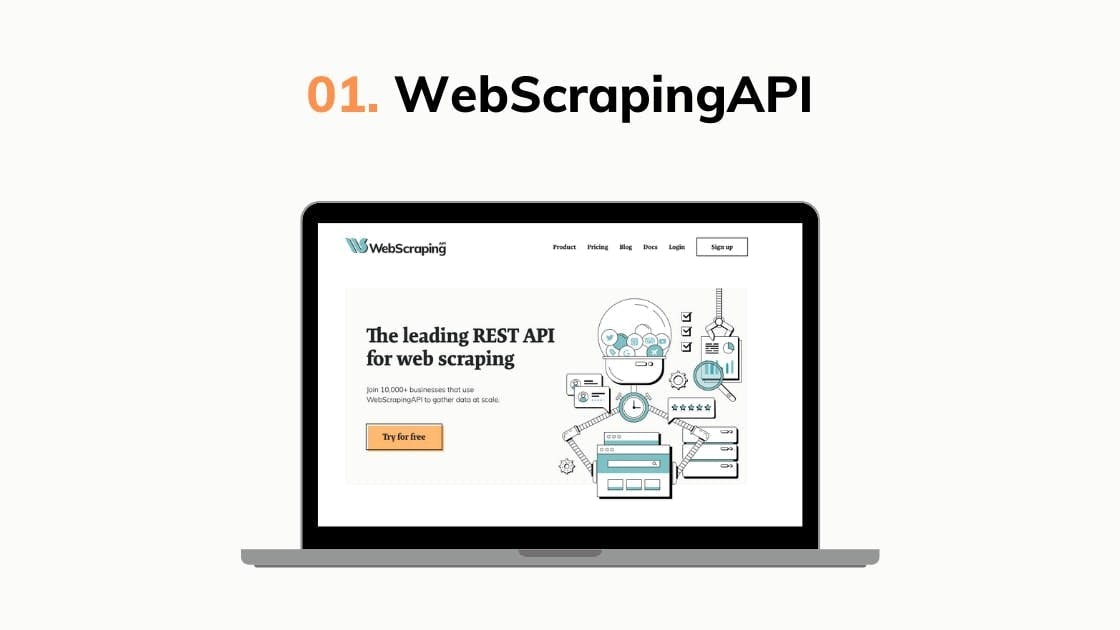
WebScrapingAPI has the advantage of a colossal proxy pool, surpassing the 100 million IP address mark. Made with developers in mind, the API is easy to integrate into scripts or connect to new software so that your data is organized and easy to share.
The cherry on top? The top-of-the-line proxies are just part of the API. You also get a reliable web scraper, capable of rotating proxies, executing Javascript, solving CAPTCHAs and scraping forms, REST APIs, and iFrames besides any webpage.
There are proxy pools for any need and any pocket - a free trial, a business plan, and a customized plan. Geolocation is unrestricted for the entirety of the first 14 days, so the world’s your oyster! The cheapest plan gets you 200,000 API calls for $20 a month.
One of WebScrapingAPI's strengths is its ability to target geo-specific data. Our regular plans include proxies from 40 different countries. You may, however, gain access to more than 195 countries with a custom plan.
There is no need to fret about your IP overlapping with anyone else’s since the proxy pool is so extensive, and failed requests are not being counted. The API will then automatically change the IP until access is granted.
Try it for yourself and see the power of a web scraper with integrated proxies for free.
2. BuyProxies
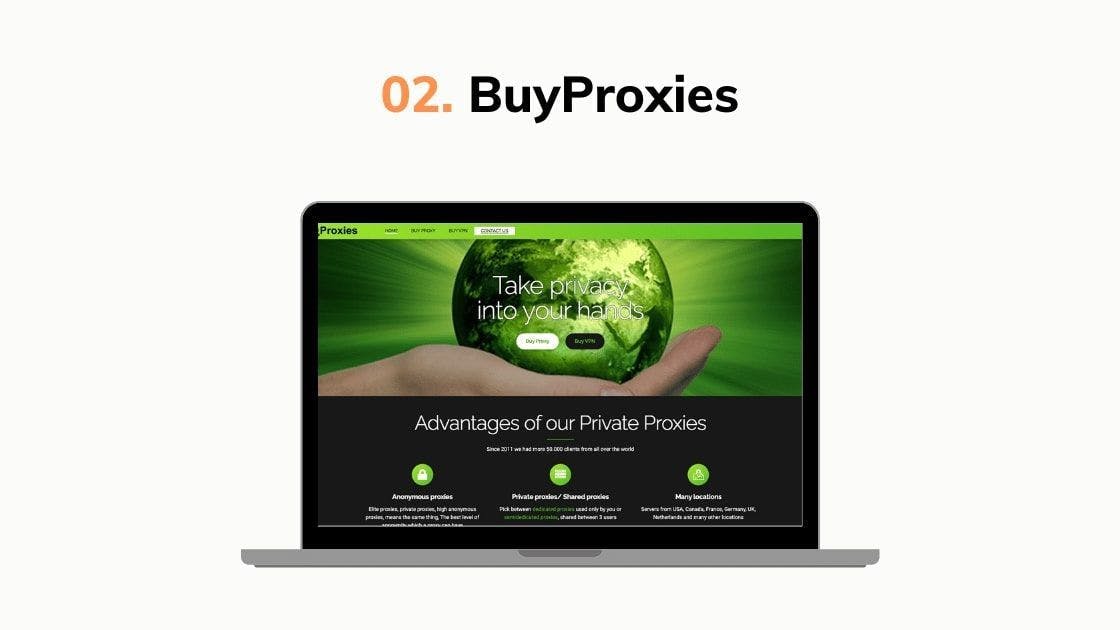
While BuyProxies IPs aren’t specifically designed for web scraping, they get the job done. Their favorable reviews attest to that. Also, their bandwidth speed will not disappoint those who want to perform tasks such as social media automation or website SEO.
They don’t disclose the actual locations of their proxies, but you have the option to get IPs from the US, Europe, or both. So, we know that their network has at least some coverage. Additionally, we couldn't find any numbers on the exact size of their proxy pool.
When buying shared proxies, the very first package costs $10 and gets you 10 HTTP or SOCKS IPs shared at most with two other users.
The dedicated proxy pricing scheme is very similar, but with one big difference: it’s double the price. So, you’d be paying $10 for 5 IPs that you don’t have to share with anyone else.
3. HighProxies
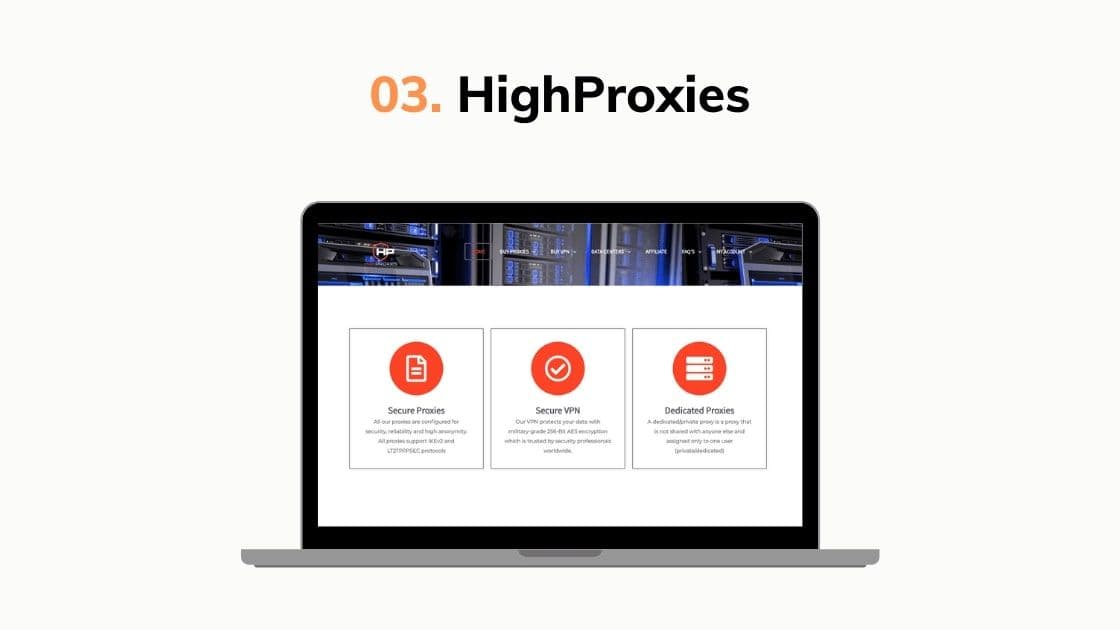
HighProxies is an excellent choice for anyone looking for a high-quality service provider. The company maintains servers in strategic locations worldwide and is always working on their speed and functionalities.
HighProxies has a network with more than 25,000 IP addresses, all of which are entirely anonymous. IP whitelisting is supported, and all subscriptions come with unlimited bandwidth and 99% uptime.
Most of their data centers are in the US, 28 locations, to be exact. An additional 11 data centers are scattered across other critical areas in North America, Europe, Asia, and Australia.
If you’re interested in dedicated proxies, you can get a single IP from them for $2.30. If that goes well, you can go as high as $1400 for 1,000 IPs.
Shared proxies start at $10.90, but you get 10 IPs for that price. The 1000 shared proxies pack runs for $700. They don’t mention how many users share the same IP.
4. Shifter
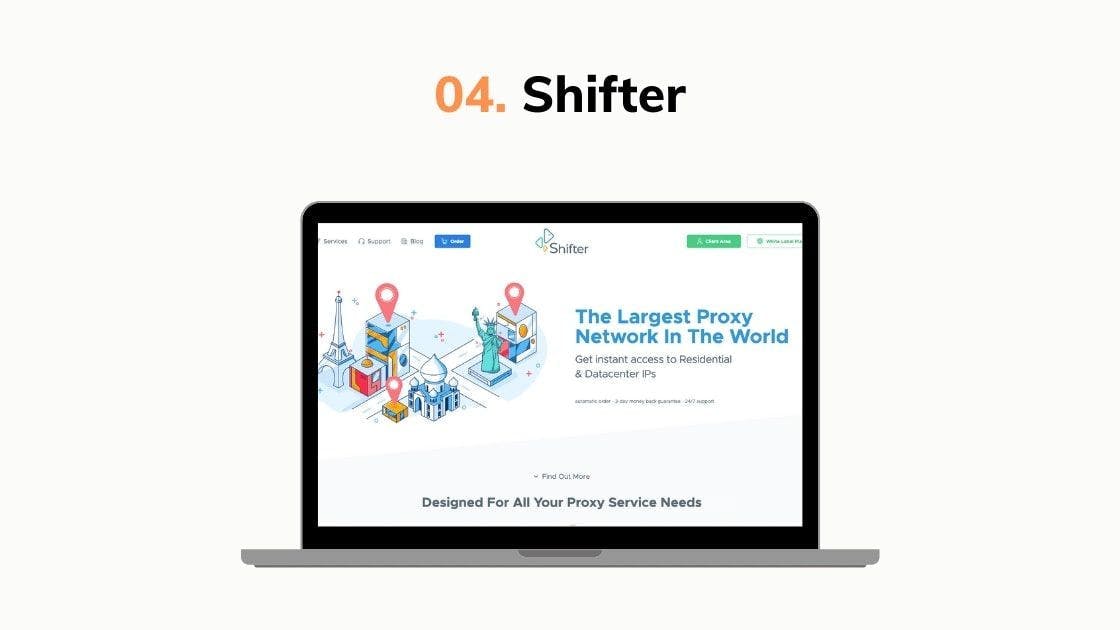
Shifter is a British proxy provider that has a proxy pool of over 31 million IP addresses. Starting off in 2012, they are most renowned for their affordable residential proxies. However, they also provide dedicated and shared packages.
All their shared and dedicated IPs are datacenter proxies from Chicago, USA. They also provide secure SOCKS5 and HTTPS protocols that encrypt data.
With unlimited bandwidth and 24/7 customer support, their basic shared proxy package comes at the price of $30 for 10 HTTP proxies with a maximum speed of 1,000 Mbps. Only thee users may have access to the same proxy.
You may also opt for dedicated proxies, starting at $25 per month for 5 IPs, with 100 connections per proxy and instant scaling. Of course, if you need access to a larger proxy pool, there are bigger plans as well.
This proxy provider’s authentication system and high level of security make it one of the safest choices.
5. SquidProxies
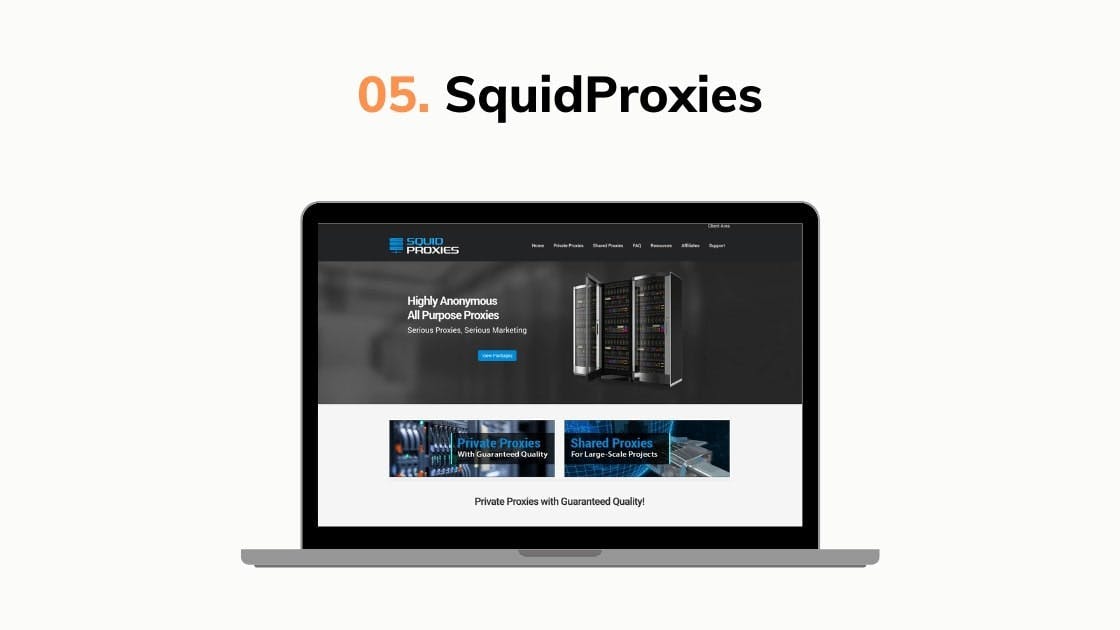
SquidProxies is another good option for developers seeking fast servers and global coverage. The company's proxies are well-known for their high performance and the shared and dedicated proxy packages available.
SquidProxies has been around for a long time and has managed to build up a strong network in that time. The corporation has servers across Asia, Australia, India, and the Middle East and provides excellent coverage across Europe and North America.
The service supports HTTP and HTTPS connections and provides highly anonymous proxies. Users can expect a quick and straightforward setup process that requires minimal configuration.
Shared proxies start at $1 per IP, with the smallest plan being $100 for 100 proxies. Note that their plans also differ in the number of locations and subnets you can access. So, if you need IPs from plenty of different places, you’ll need a more expensive package.
When it comes to private proxies, a single IP address comes at the price of $2.40, with the package totaling $24 per month for ten dedicated IPs.
6. MyPrivateProxy
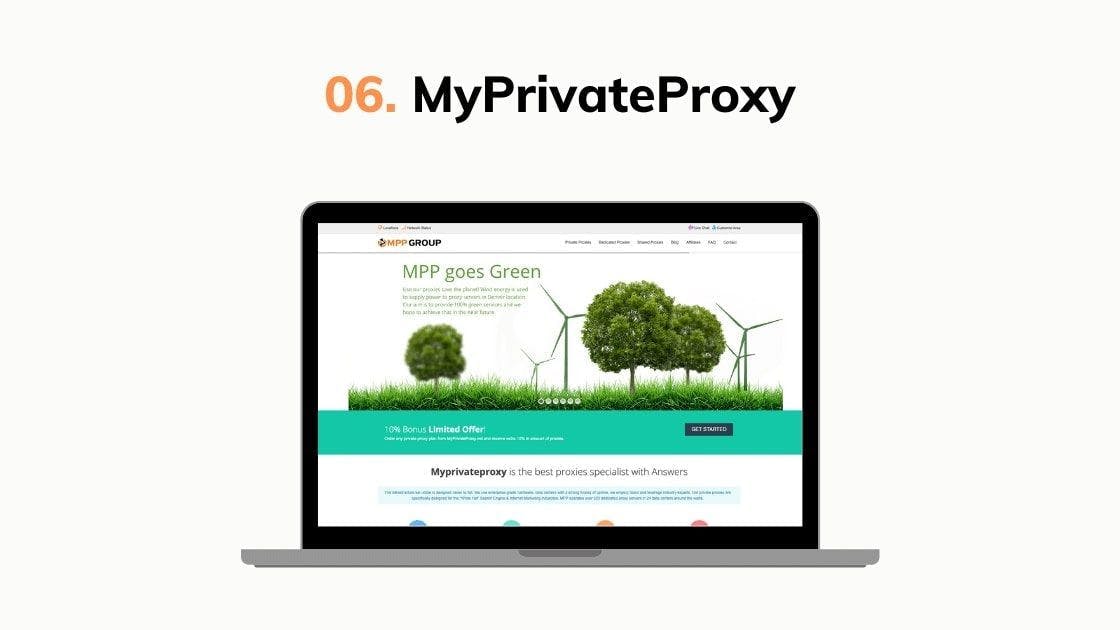
MyPrivateProxy is a Seychelles-based proxy service. They have established a reputation for themselves since their inception in 2011. While they do not provide a free trial, we believe they are worth considering.
MyPrivatePoxy’s IPs are based on HTTP. However, if you need SOCKS proxies for some specific apps, you'll have to seek elsewhere because they don’t have that option.
On the subject of geolocation, they have 26 locations across the US plus 10 extra areas: the UK, France, the Netherlands, Germany, and Canada.
The smallest shared proxy package starts at $50 per month for 50 IPs, giving you access to two subnets and two locations.
You can also rent a single dedicated IP for $2.49. The following package nets you 5 IPs for $11.75 per month and the same subnet and location functionalities as the shared proxy plan.
7. ProxyBonanza
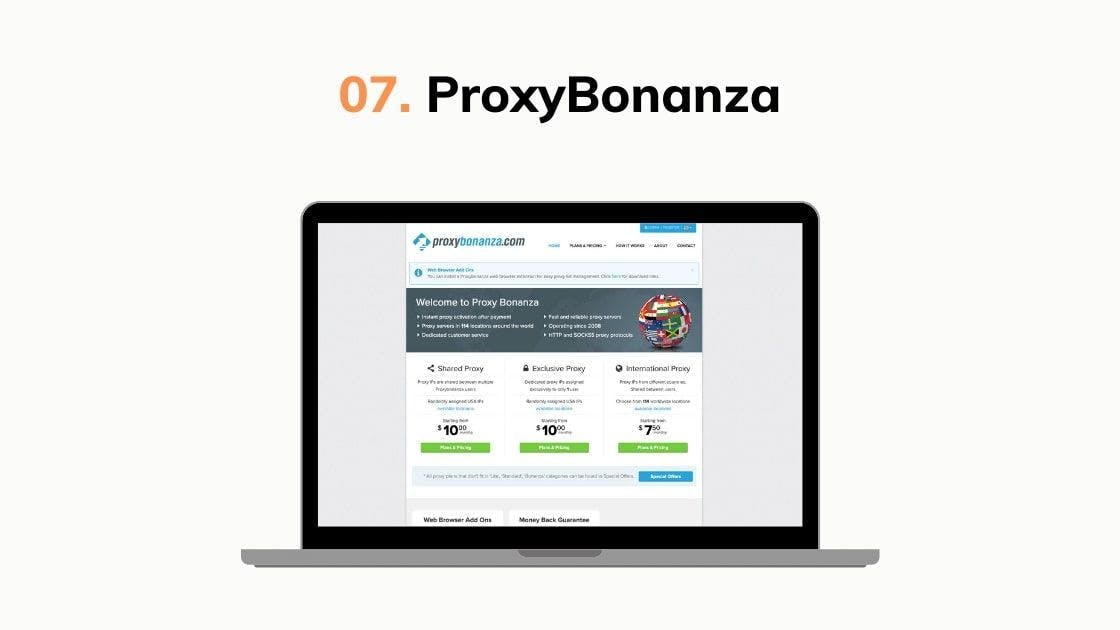
ProxyBonanza is one of the least expensive providers, with prices beginning at $10. Their proxy pool includes IPs from 114 different countries, with several options for creating your own proxy network.
Another cool thing about them is that they built browser add-ons for Chrome, Firefox, Opera, and Microsoft Edge. With these programs, you can switch between IPs on the go. While it won’t help with web scraping, it’s a good thing to have for anonymous browsing.
ProxyBonanza offers a subscription-based service that provides anonymous Socks5 and HTTP proxy lists. They have several packages categorized by type (shared or dedicated), location, or special deals.
You can choose a custom number of shared IPs, with the lowest amount being 25 proxies with a total of 10GB of bandwidth for $10.
Dedicated proxies are considerably pricier, with $10 being the price of a single IP, but your bandwidth won’t be limited.
For geolocation, you can pick precisely the locations you need or choose packages that include one IP from each country and pay based on how much bandwidth you use.
Why compromise?
All things considered, there will be times when you’ll need the functionalities of a dedicated proxy and times when you can save money by using shared IPs for the same result. It all depends on your use case. So, we believe that you should focus on flexibility when choosing a proxy plan.
We’d like to leave you with a parting message. Remember why web scrapers became a thing in the first place: to save you time and energy while showering you with valuable data. To that effect, we believe that you should try WebScrapingAPI, which handles every part of the data extraction process so you can focus on the tasks only you can do.
Try the free trial and enjoy all the capabilities of WebScrapingAPI; no credit card required!
News and updates
Stay up-to-date with the latest web scraping guides and news by subscribing to our newsletter.
We care about the protection of your data. Read our Privacy Policy.

Related articles
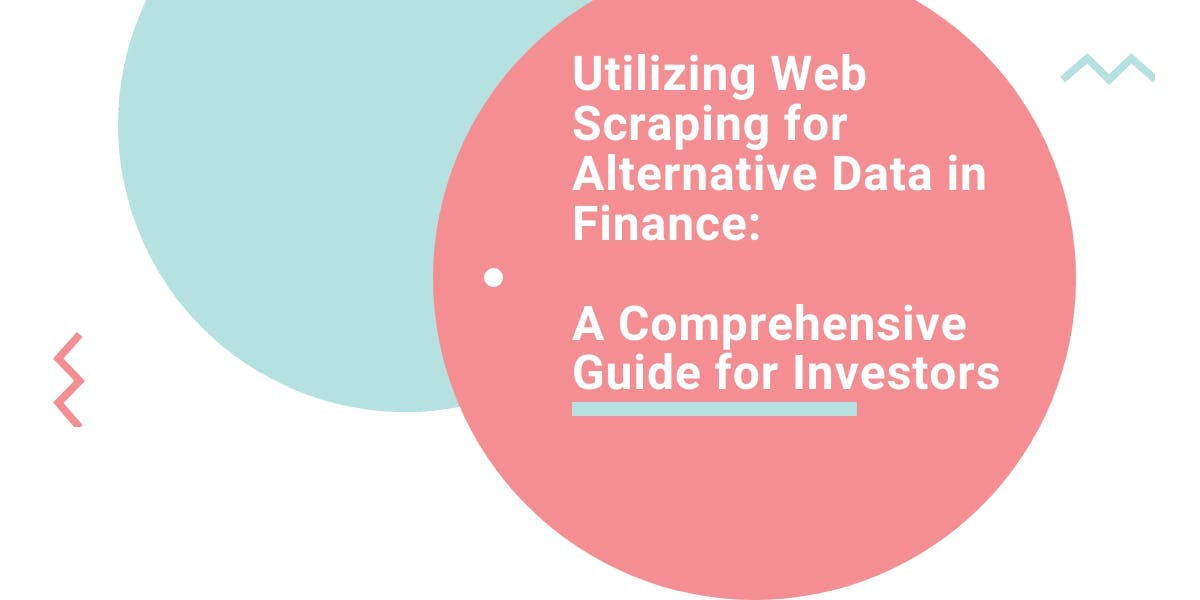
Explore the transformative power of web scraping in the finance sector. From product data to sentiment analysis, this guide offers insights into the various types of web data available for investment decisions.


Discover how to web scrape Idealista with our step-by-step guide. Extract real estate data and gain valuable insights for your business. Learn more now!


Discover how to create a web scraper with Pyppeteer, a Python library for controlling headless Chrome. Our guide covers installation to coding. Start web scraping now!
